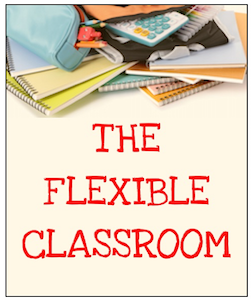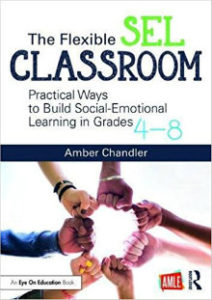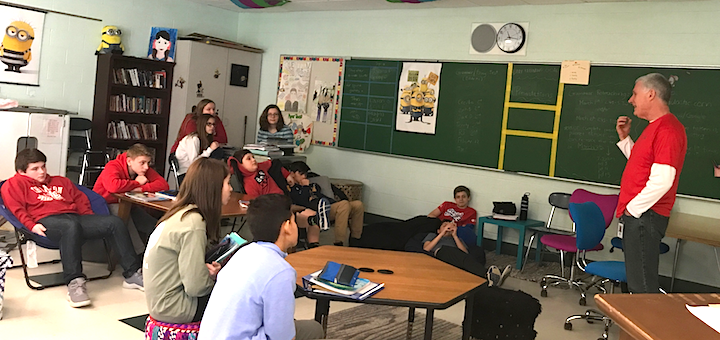Every School Has Givers with Memories to Share
A MiddleWeb Blog

Mr Matt Schoeffield, my students’ guidance counselor, had stopped by to chat with me. While students were filing in, I asked Mr Schoeffield to come back the following week to watch some of The Giver student presentations. He agreed and then asked that, if we had any extra time, could he speak with the students.
Of course he could. About what? He then said the most interesting thing: “I’m the Giver.”
As soon as Matt said that phrase to me, my head was spinning. Of course he is! How could I have missed this amazing opportunity to talk with my students about institutional memory and the importance of collective shared history during all these years of teaching the novel?
I swear, I’ve come at this book from every angle I thought possible: social commentary, a parable for growing up, a post-Feminist Manifesto, and several other lenses with less staying power. Yet, here I was with a brand new approach, so I immediately made time for Mr Schoeffield to share his perspective with my 8th graders.
Forty years of connecting
Mr Schoeffield has been a guidance counselor in my district since 1978, or, as I like to remind him, since I was four years old. In that time, he has served with 15 superintendents, 6 principals, 14 different assistant principals, and has worked with 13 other counselors, and around 600 or so teachers. His best guess is that he’s worked with about 6000 students.
As Matt “the Giver” spoke with our students, he told them stories, and we regaled them with “the way it used to be” memories. Here are a few of the shocking details that my students learned about:
- Remember when there was smoking allowed in the teacher’s lounge?
- Remember when we didn’t have computers in our classrooms? Or phones?
- Remember when students wrote their first research paper as Juniors in high school (not middle school students or younger)?
- Remember when students could be paddled by a teacher or principal?
- Remember when teachers dressed up every day?
- Remember when girls had to wear skirts or dresses? (This one was his, not mine)
As we continued the discussion, Matt asked students why we might need to share these memories with them. Every period, some well-trained student would toss out the old adage, “Those who do not learn from the past are doomed to repeat it” or some version thereof. Though we agreed, we continued to push.
Why must all of us share our stories?
With the multitudes of pictures, Instagram posts, Facebook messages, and the like, why do we need to worry that our stories will be lost? I’ve been thinking about this generation’s obsession with documenting everything, yet never tangibly holding a physical document at all.
Most of these kiddos don’t have composition books filled with the songs they write or paper journals scrawled with their teenage angst. Instead, they share, share, and share online, yet once a Snap is sent, or a post read, it just becomes a part of a digital dumping ground of information. (I wrote about the #Selfie thing here.) Matt and I both felt the weight of our words as we tried to evoke a past that they couldn’t even conceive.

Matt explained that he wanted students to know the stories, and that he wanted them to share their stories too. Matt attended presentations in the following days, once with blue hair for our spirit games. I am hopeful that students will be able to pass on his legacy too.
Matt has been a champion of students, collaborator with teachers, and a voice for compassion throughout his entire career at Frontier, and I know that his actions have rippled across generations, as he talked to students about having been their parents’ guidance counselor too.
The power of collective memory, one school at a time
Every school has a Giver, and I only wish that I had sought Matt out earlier, had more time to learn from him, and had more opportunities for him to share with our students. This entire experience has me looking for ways to incorporate a “Giver” each year.
As a sort of tribute to Matt, I’m going to invite an “elder” in each year to share their experiences with students. I’m hoping that sharing this with you will encourage you to find your “Giver” at your school and to harness the power of the collective memory. Now, more than ever, students need to know where they came from and reflect upon their impact on the future.
_______________





































Hi Amber,
This is such a tribute to Matt, and so well written. He truly is the history of FMS! Thank you for recognizing this!
Ann